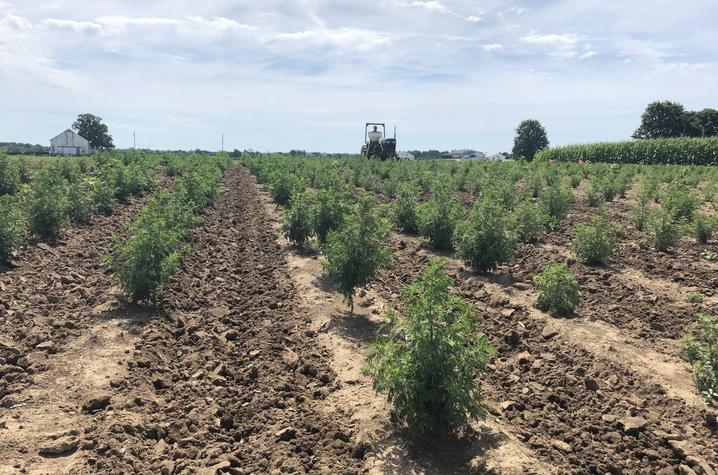Artemisia Annua Could Be Promising Treatment for COVID-19

LEXINGTON, Ky. (June 25, 2020) – Recent lab studies by chemists at the Max Planck Institute of Colloids and Interfaces (Potsdam, Germany) in close collaboration with virologists at Freie Universität Berlin have shown that extract from the medicinal plant Artemisia annua, also known as Sweet Wormwood, is active against SARS-CoV-2, the virus that has caused the COVID-19 pandemic.
The new potential treatment has been added to the University of Kentucky’s innovative clinical trial for experimental COVID-19 therapies, which was launched by leaders from UK’s Markey Cancer Center, College of Medicine and College of Pharmacy in May.
The new arms of the clinical trial will test the effectiveness of Artemisia annua extract as well as artesunate, a derivative of the plant that is a standard treatment for malaria in many parts of the world.
The new trial arm is supported by ArtemiLife, which recently collaborated with UK on a clinical study using Artemisia annua grown in Kentucky to test for the anti-cancer activity of its extract and to determine the recommended dose of Artemisia annua for future clinical trials.
“The University of Kentucky and UK Markey Cancer Center are delighted to continue our collaboration with ArtemiLife to study this Kentucky-grown Artemisia annua as a potential treatment for patients with COVID infections,” said Jill Kolesar PharmD, co-leader of the Drug Development Program at Markey Cancer Center and professor in the University of Kentucky College of Pharmacy.
The ongoing trial has a “pick-the-winner” design, which will allow UK researchers to rapidly understand what potential therapies appear to be effective, guiding patients to treatments that work and researchers to promising drugs that warrant further investigation.
“While there is no standard treatment for COVID-19, this trial gives us the ability to test multiple therapies rapidly in order to identify the most promising agents,” said Dr. Susanne Arnold, a medical oncologist and associate director of clinical translation at the UK Markey Cancer Center who is co-leading the trial. “This rapid assessment means that the trial can quickly include and test new therapies such as Artemisia annua.”
Each treatment is selected by a multidisciplinary committee of medical experts from across the university as some of the most unique and promising compounds that can be studied at the moment. The drugs are also attractive candidates for repurposing for treatment of COVID-19 considering they have excellent safety profiles and are readily available, rapidly scalable, and relatively inexpensive.
UK’s clinical trial is reserved for high-risk patients both at home and in the hospital who have tested positive for COVID-19, or who have COVID-19 symptoms but have not developed severe symptoms that would require intensive care unit treatment. Patients with COVID-19 who choose to enroll in the trial will be randomly assigned to one of four treatment groups including Artemisia annua.
UK’s COVID-19 related research is coordinated by the COVID-19 Unified Research Experts (CURE) Alliance team, which is uniting UK medical researchers across disciplines in the fight against the novel coronavirus. The Alliance was launched and is supported by UK College of Medicine Dean Robert DiPaola and Vice President for Research Lisa Cassis.
The team plans to scale up a larger, more traditional placebo-control clinical trial using the most promising therapy from the pick-the-winner trial.




